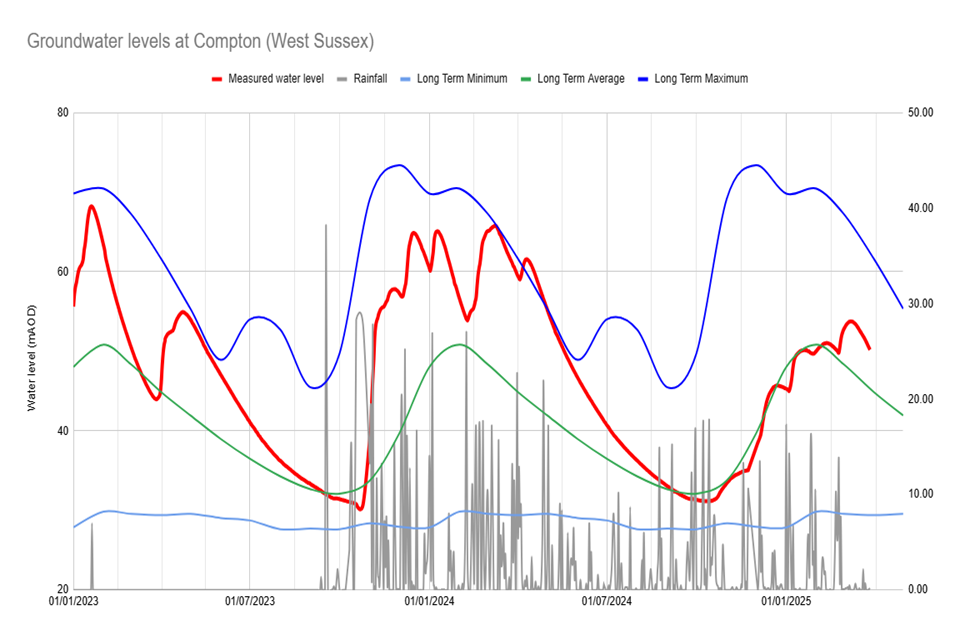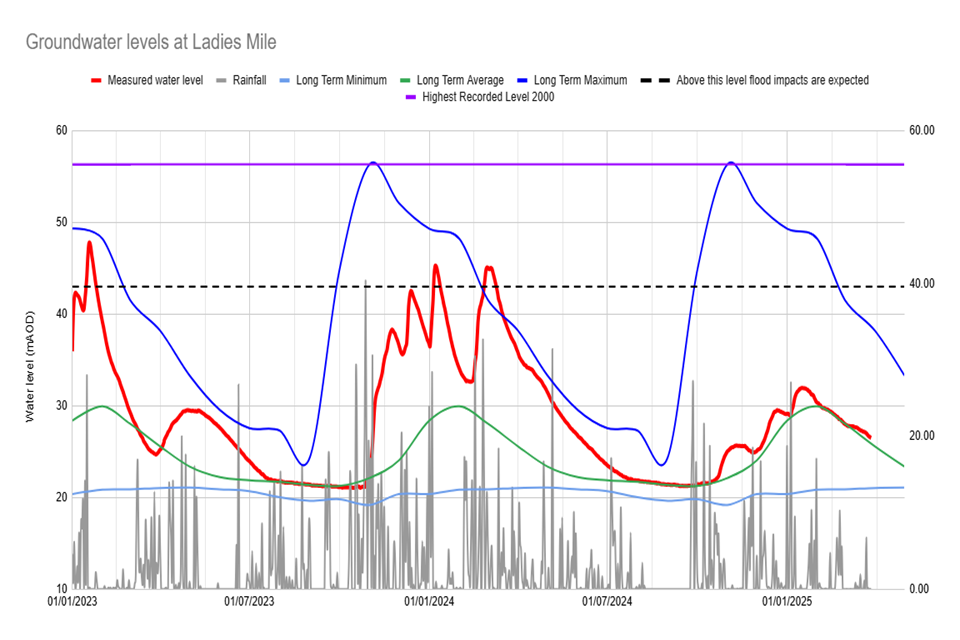Groundwater situation: Sussex, 28 March 2025
Updated 28 March 2025
Applies to England
Current situation
Over autumn and winter 2024 to 2025, Sussex has recorded slightly above average rainfall. The end of September 2024, and the end of November 2024 were particularly wet. January 2025 began and ended with a lot of rain, and above average rain was also recorded in West Sussex at the end of February 2025. Hardly any rainfall has been recorded so far in March 2025.
Groundwater levels in Sussex are roughly average for the time of year. In some locations, groundwater is a little higher than average for the time of year. However, no groundwater flood impacts are thought to be currently occurring, and groundwater is now slowly falling at all boreholes.

Graph showing changes in groundwater levels in Compton Borehole in West Sussex from January 2023 to April 2025. The graph shows that groundwater levels are currently above average, but falling.

Graph showing changes in groundwater levels in Ladies Mile Borehole near Brighton from January 2023 to March 2025. The graph shows that groundwater levels are currently about average.
Weather forecast
Only a small amount of rainfall is forecast for the five days from 28 March 2025.
Long-term weather forecasting is extremely difficult. There remains uncertainty and predictions might change, but currently, mostly settled conditions are expected in the south east of England through much of April 2025.
Forecast risk of flooding
We predict that groundwater will continue to fall in indicator boreholes in Sussex, through April, spring and summer 2025.
It is very difficult to accurately predict the weather weeks or months ahead, and the forecast might change. The exact groundwater response will depend on the amount, intensity and distribution of any rainfall that occurs.
However, as day lengths will increase and warmer temperatures lie ahead, we’d need an exceptional amount of rainfall to cause groundwater levels to rise again before autumn. Groundwater flood impacts are not expected for communities in Sussex this spring or summer.
Next update
With groundwater flood risk reducing, we do not intend to update this groundwater situation document through spring and summer. We will likely re-issue this groundwater situation document in autumn 2025, or when there is a risk of groundwater flooding.
When in force, groundwater flood alerts are updated with information more frequently.
What we are doing
We continue to monitor groundwater levels and their response to rainfall.
Throughout autumn and winter, we will update this groundwater situation and our groundwater briefing notes.
We will issue and update flood alerts when there is risk of flooding affecting property.
We liaise with the local authority and other responding partners to ensure they are aware of the situation.
Our operational staff will remove blockages from main rivers, to ensure they flow freely.
Actions and advice
Think and prepare now for what you’ll do if flooding occurs where you live, don’t wait until flooding happens.
Call Floodline on 0345 988 118 or visit check for flooding to find out if you can register to receive free flood alerts for flooding from groundwater.
Look for data in your area:
There is practical advice on what to do before, during and after groundwater flooding, and further guidance about groundwater flooding, how it might affect you and what to do.
Prepare a personal flood plan or community flood plan to help you and your community decide what practical actions to take before and during a flood, which will help reduce the damage flooding could cause.
Check pumps and any other flood protection equipment you have. Ensure valuables are moved from basements and other low parts of properties.
Where safe to do so, communities may wish to check and ensure there are no blockages in local watercourses and ditches.
Further information
You can view:
- daily groundwater levels compared to average and maximum, with indicative impact thresholds
- sub daily groundwater levels on Gaugemap
- the latest flood alert information
- water situation reports
More detailed groundwater briefing notes are emailed as part of the flood alert service. See contacts section below to register your email address.
Contacts
For more information on the flood alert service and to find out what messages you are registered to receive, call Floodline on 0345 988 118.
Alternatively, you can contact the following for additional information:
- Environment Agency Customers and Engagement: ssdenquiries@environment-agency.gov.uk
- Environment Agency Incident Reporting Hotline: 0800 807060
- Environment Agency National Customer Contact Centre: 03708 506 506

